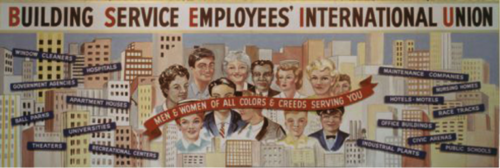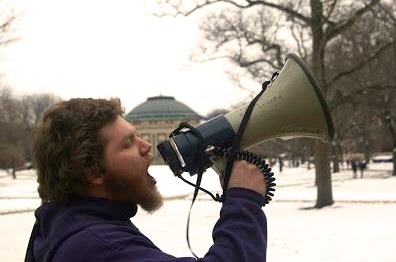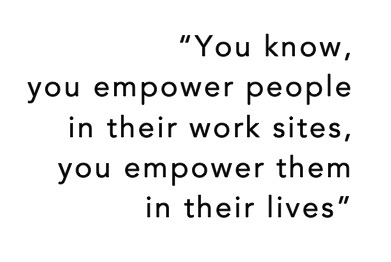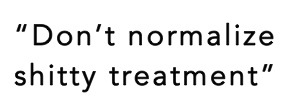
Lena Reynolds: What kind of workers do you work with?
Thomas Haley: I’m an external organizer, for people outside without unions. They call us. We have three locals in Illinois: HCII is healthcare, local 1 is for the private property services, and we’re local 73, for the public property service workers. It’s a broad range. We represent members in the cook county justice system, like detention aides. We have crossing guards for school kids that work with the Chicago Police Department. It includes the guards downtown at Millennium Park. We have people in CPS, like bus aides, bus monitors, custodians, service workers… It includes the Urbana park districts and the University of Illinois in Urbana-Champaign, which is actually where I got my start.
LR: What drew you into labor organizing?
TH: I got hired at the U of I as a custodian. I didn’t even know it was a union job until a 70 year old guy comes up to me when I was working nights. At like three in the morning, he slaps a card down on the table and says, “sign this.” I said, “what is it?” “Your union card!” Well I was an inactive member until I had some problems with management. I had a foreman who was messing with me, and I didn’t really know how to deal with it. And I was lucky, because I did some things that probably could have gotten me disciplined, you know, being a smart aleck, insubordination… But nothing happened, and so I contacted a steward for the union in our shop. “How can I get involved? How do I learn to protect myself from situations like that?”

He got me involved with our local. I became a steward, then a board member, then a bargaining team member. Management was pushing a really hard deal on us, so we went on strike in March of 2013. It went on for three days and had a 97% participation rate out of about 800 workers. We had only 12 verified scabs (person who goes to work during a strike).
LR: Wow!
TH: Yeah! Trash was piling up all over campus. They ended up putting big trash bins in the hallways and they were all overflowing by the time we got back because there was no one to empty them. Foremen were trying their best, but you can’t replace 800 workers with like 5 people. We voted to go on strike after about 9 months of bargaining and really getting nowhere from management. A strike is a very powerful tool in the members’ tool chest, you know. Nothing takes the boss out of business like taking your labor out of the shop. So that thrust me into a light of recognition. I did a lot of interviews with papers in the area. I was on a national radio show, and I got noticed by local 73 in Chicago. They asked me to come up to become an organizer.
LR: So what does a day look like for you?
TH: I asked my friend that before I got hired, and she said, “there is no normal day.” I’m on call 24 hours a day, 7 days a week for potential members. Whenever they want, I will meet them. On “normal” days we’ll come into the office to research things and do the support work for our active campaigns. That’s the boring side, but split that with being out in the field, I’m talking to people about forming their union.
In my job, you’re either crawling or sprinting. In campaign mode, it’s 13-14 hour days, everyday until the election, so the workers stay informed. (When workers vote to unionize) It’s not just like you file, you get an election, and you win. The boss does everything in their power to stop you from having a union. They’ll hire expensive lawyers, they’ll lie, they’ll intimidate. The power structure puts them up high and workers down low, but with a union, they’re equals. They can’t unilaterally change things in the workplace without consulting with the workers. In Illinois, without a union contract, you’re an at-will employee. You can be hired and fired at management’s whim. You have absolutely no recourse about it, no protections.
LR: The face of labor has changed over the last generation, how has SEIU changed with the times?
TH: Our organization changed THE times. We were the first international union to put a large portion of the budget into organizing. We’re the fastest growing service employees union in the world with over 2.2 million members worldwide.
There’s a lot of misinformation about what a union is. The message has been so skewed they just think of overpaid, lazy workers. That’s where I think labor has dropped the ball, because the messaging hasn’t been there. The right wing has been telling everyone how bad unions are and unions are just looking inward, maintaining their groups, instead of looking out. And that’s great to work for your members, but not everybody has that chance.

We’ll ask the worker, “do you know what a union is? What is a union to you?” and they’ll say, “it’s a group that comes in and helps us.” And I say, “No, the union is YOU. Your union is only going to be as strong as YOU guys.” Our job is to go in there to encourage and empower them. Because most the time if they’ve called us, they’re at that point in their career where they’re like “what’s the worst that’s gonna happen, I’m miserable already. I could lose my job any day anyway.” A boss could fire you tomorrow if they don’t like your haircut.
But there’s people speaking out again now, starting to point to how the economy worked when like 30-40% of the country was unionized. The higher that number, the higher the median income. Now you see more people (the majority) working for minimum wage. You see union density at 6% and dropping, and the difference between the haves and the have-nots growing.
LR: What are some other initiatives going on?
TH: Our international has also been involved with the Fight for 15 campaign. It started off with fast food workers trying to make a living wage. People say they don’t deserve $15, but if minimum wage had kept up with inflation since the ‘60s it would be around $21. There are fast food places on every block. So many people are needed to staff these places that it’s not just the high school kid anymore, because there aren’t enough of them. It’s becoming more middle aged people with families, and people with college degrees that can’t find jobs. Wage theft is rampant; wages are garbage.
Our international took an early role in getting involved, and now it’s grown. We’ve started the nation-wide conversation about minimum wage. Cities are raising to $10/$12 and Seattle and San Jose have reached $15/hr. These companies are making billions, while their workers are forced to live on subsidies from the government. So we’re collaborating, and it’s not just the workers, it’s their families, their clergy, their community members… People realize that if they make more, they’ll bring that back into the community, which can support itself. It’s not just the rich hoarding everything. That’s why SEIU is so awesome, it’s social change, not just labor change.

LR: I think that’s a great example of how the shift of workers has changed over the last generation, so the shift of labor and our consciousness about it needs to change too.
TH: Yeah, they say history repeats itself. At one point the mine workers were helping the auto workers. The auto workers helped the electricians build their union. Nowadays you see the service workers helping the fast food workers build their union. It’s not just $15. They want $15 and the right to unionize without fear of retaliation. SEIU knows they’re not going to be organizing with us, but they will have the ability to build the labor movement as a whole. You know, you empower people in their work sites, you empower them in their lives, you take that out into the world. My whole job is to empower somebody to do what they want to do. If you can’t tell I love my job!
LR: Do you think you’re going to do this forever?
TH: Not as an organizer, but I’m going to be involved with the labor movement in some way. People seem to really like me being around, so maybe I’ll run for election someday. That’s another thing we face. It’s OUR turn to start building the labor movement. It’s about informing our generation.
LR: Hopefully this interview will inform my classmates of our generation.
TH: Let them know, they should vote, but most importantly, don’t normalize shitty treatment. If you’re getting treated poorly on the job, recognize that, stand up against it. There are avenues for you to take. If I had a dollar for every time I’ve heard of someone who got crapped on at work, who just normalized it. I’ve talked to workers who just go home and cry because they can’t do something for their family. They sacrifice, making choice on food or medicine or rent. You don’t have to just take it. The message has led everyone to believe “well its just the way it is.” No. Speak up and you strengthen everyone around you.

No comments:
Post a Comment